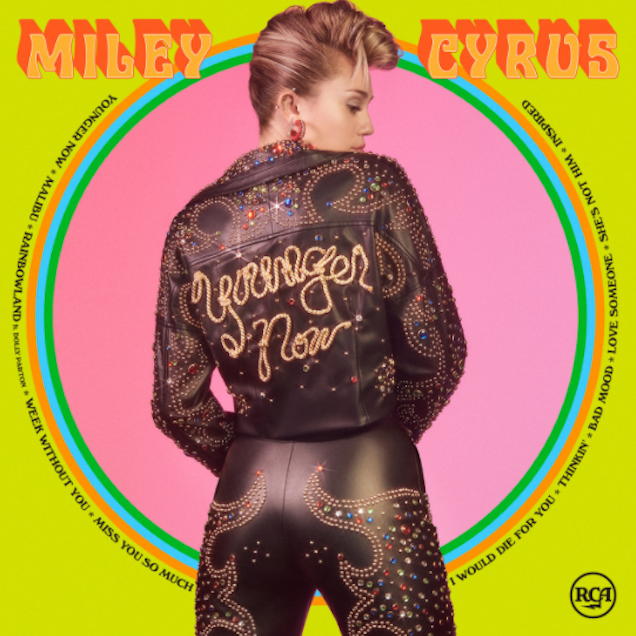There’s no way to be as clumsy a celebrity as Miley Cyrus—to unknowingly become the purest example of white privilege in a time where the concept was finally being reckoned with on a public scale, to host an awards show only to be called out for that privilege, to release a 23-song album so insanely stoned that your label wouldn’t even really call it an album, to roll back that persona that was the manifestation of white privilege but in a way that showed you learned nothing—without at least being incredibly honest with the public, so honest that it bleeds right into naïveté.
For all her faults, and there were and are many, Cyrus was a fascinating artist simply because of that honesty alone. Bangerz, her 2013 album executive produced by Mike Will Made It, was rightly controversial, given the garish poses she pulled in the video for lead single “We Can’t Stop,” twerking a little too gleefully and grilling the camera like a teenager who had just wrapped tin foil over her teeth. But divorced from the visuals—including the non-problematic but instantly memeified “Wrecking Ball” video—the album was also easy to love. On the songs alone, Bangerz was a perfectly contemporary pop album in a very classic sense: it interacted with the sounds of the time, but still felt entirely idiosyncratic.
Instead of glomming herself onto rap the way she did in the “We Can’t Stop” video, rap was woven into Bangerz in a manner that felt befitting any millennial, and also true to Miley herself. The Big Sean feature “Love Money Party,” for instance, is built on top of a Mike Will production that easily could have been a Rae Sremmurd beat, but the song itself is about striving for something real among the superficiality of life. “My Darlin’,” her duet with Future that interpolates “Stand By Me,” is a believably cathartic fight for a future of a relationship amid turmoil. Best, though, was “4×4,” the Nelly collaboration, a hoedown of sorts that nods not just at her country background but his, and features the memorably goofy, and well, honest, image of Cyrus driving so fast that she feels like she’s gonna piss on herself.
There is much less to love on Miley Cyrus and Her Dead Petz, the album she surprise released after her stint hosting the 2015 VMAs, which was made almost entirely with Wayne Coyne and the Flaming Lips. The album is mostly a noodly near-disaster, though it is that proudly, and there’s songs on it, like the space-country ballad “Space Bootz,” that are Miley canon. But more to the point, it felt unrepentantly like her: She had made it clear already that her and Coyne were kindred spirits of sorts (unsurprisingly), and so, if you were already a fan, when she dropped this pile of junk over your head you couldn’t do much but laugh and start rummaging through.
When her music then became attached to her Happy Hippie Foundation with a series of homegrown covers and performances with artists like Laura Jane Grace, Joan Jett, and Ariana Grande, it represented a full step back from the don’t-give-a-fuck punk that infamously grinded on Robin Thicke. But it, too, felt earnest and honest. The stripped-down performances did not feel like a cynical ploy for authenticity but instead like the full reveal of Cyrus’ talents. She would go on to perform an acclaimed version of “50 Ways to Leave Your Lover” for Saturday Night Live’s 40th anniversary.
All of which makes her new album, Younger Now, such a bummer. Done only with frequent collaborator Oren Yoel, it wants you so badly to make a connection to the rootsy Cyrus that it almost feels as if you’re being handheld, like when an adult gingerly guides the one child who can’t quite pin the tail on the donkey. Cyrus herself made this pretty clear in a Billboard cover story in which she came off poorly, saying that materialism and sexualization of women “pushed [her] out of the rap scene” and influenced the creation of Younger Now, a breezy pop-rock album that pulls entirely from the sounds and tropes of country music.
It didn’t help that the album’s singles were so limp. The first, “Malibu,” wants badly to be a Sheryl Crow anthem, but it only has one melodic idea that doesn’t hold up to repeat lessons. The title track is even worse, a whiny and tuneless mea culpa in which Miley can’t even be bothered to erase her past with anything other than cliches—”You know what goes up must come down,” she sings. “Change is a thing you can count on.”
Where her past albums felt messy but painfully sincere, Younger Now comes off as safe and overly sanitized, with the frisson that made Cyrus a star all but entirely blasted away. Here, she leans into her most insipid tendencies, like on the Dolly Parton-assisted “Rainbowland,” a mushy paean to hazy escapism that goes, “We are rainbows, me and you / Every color, every hue / Let’s shine through.” This Miley, the hippie who yearns for some vaguely better world despite being afforded the most comfortable possible existence at birth, is the singer at her most grating, and unfortunately that persona is more present here than at any point in her discography.
Still, the album has some plainly good songs. It looks into a groove in a middle section devoted to devotion, starting with “Miss You So Much,” which really centers the twang and physical power of her vocals (you will have to ignore more shit about looking up at rainbows, though). Even better is “I Would Die For You,” the sort of pained love song that she could believably deliver for decades to come, and “Thinkin’,” the album’s best track, which has a sticky chorus piled on top of ringing guitar chords. But the album mostly peters out from there, culminating with “Inspired,” a pretty song about her father that unfortunately hangs on a line—“I hope you feel inspired / Oh, I hope you feel inspired”—that takes the listener for a simpleton.
What Cyrus was attempting to do here—to make herself more easily consumable by the public—is obvious, but the album makes it clear that, for better or worse, that notion misunderstands her appeal, or at least the creative process that once made her music great. Younger Now is the first time where it feels like Cyrus is really trying to sell us something, to push our thinking about her to a predetermined place, and it shows in an album that is, contrary to her pleas, rather uninspired.





